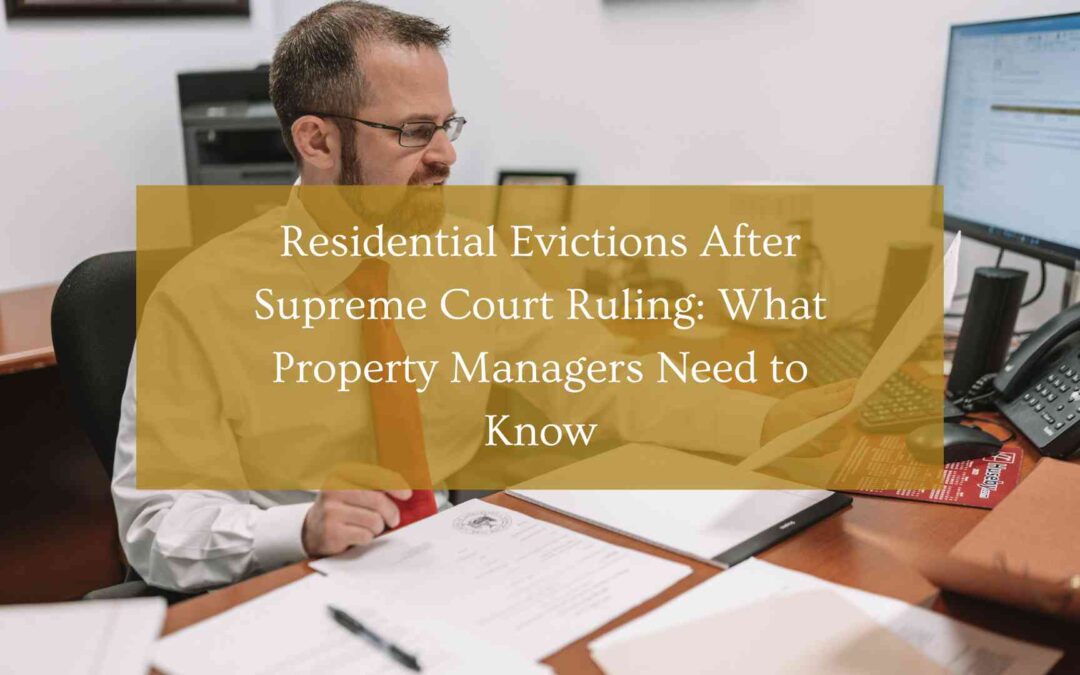Residential Evictions After Supreme Court Ruling: What Property Managers Need to Know
A per curiam ruling handed down by the U.S. Supreme Court on August 26, 2021, ended the moratorium on tenant evictions imposed by the Centers for Disease Control and Prevention (CDC). The court ruled on the case of Alabama Association of Realtors, et al. v. Department of Health and Human Services, et al., finding that the CDC exceeded its legal authority in imposing the ban on evictions in the United States. This moratorium was put in place by the CDC in an effort to slow the spread of the COVID-19 virus, which has resulted in pandemic conditions in the United States and around the world. The Supreme Court upheld a previous decision by the U.S. District Court for the District of Columbia, which vacated the moratorium on the grounds that “the statute on which the CDC relies does not grant it the authority it claims.” For many, the COVID-19 pandemic has created significant uncertainties and risks, especially in cases of real estate lease and contract enforcement in NJ.
History of the CDC Moratorium
The Supreme Court decision outlined the origins of the moratorium on evictions, noting that it began in March 2020 with the passage of the Coronavirus Aid, Relief, and Economic Security (CARES) Act. This legislation included an eviction moratorium for properties that were financed by federally backed loans or that were participating in federal assistance programs. This Congressional moratorium was allowed to expire in July 2020. At that time, the CDC issued its own moratorium on evictions, which applied to all residential properties and not just the ones that were covered by the CARES Act.
This additional CDC moratorium was scheduled to end on December 31, 2020. Congress elected to extend the stay on evictions, however, as part of a second pandemic relief act. When this protection ran out, the CDC once again stepped in to extend the eviction moratorium first through March, then through June and finally until July 2021. The recent Supreme Court decision comes after a series of challenges and stays that allowed the CDC moratorium on evictions to continue.
The Courts Step In
During the moratorium on evictions, the Alabama Association of Realtors and other plaintiffs filed suit against the Department of Health and Human Services, arguing that the CDC had significantly exceeded its authority in extending the moratorium far beyond the limits set forth by Congressional legislation. The U.S. District Court for the District of Columbia found for the plaintiffs but put a stay on the court order to end the moratorium, referring the case to higher courts and eventually to the U.S. Supreme Court.
On June 29, 2021, the Supreme Court declined to lift the moratorium on tenant evictions, noting that the moratorium was set to expire in just a few weeks and that allowing it to remain in place would provide more time for relief funds to be disbursed to renters to provide added help for landlords and tenants alike. Despite approval by Congress of about $46 billion in rental assistance, less than $1.5 billion had actually reached renters as of June 2021. When the CDC reimposed the moratorium on August 3, 2021, however, the U.S. Supreme Court ruled that the CDC had no authority to do so and lifted the ban on evictions on August 26, 2021.
Reasons Behind the Supreme Court Decision
Along with the assertion that the CDC had overstepped its legal authority, the Supreme Court decision also cited the release and distribution of effective vaccines and the increased distribution of rental assistance over recent months as contributing factors to their decision to end the CDC moratorium. The U.S. Supreme Court stated that Congress must specifically authorize any future federally imposed eviction moratorium.
Good News for Property Owners
The CDC moratorium on evictions has left many landlords in a precarious financial situation with no real end in sight. This action by the U.S. Supreme Court, however, will allow landlords and property managers to pursue legal remedies against tenants who have not or will not meet their agreed-upon rental fee obligations. This could help to stop the financial losses sustained by property managers and owners that have resulted from the unilateral actions of the CDC.
Working with a qualified law firm with experience in eviction law and civil litigation in Morristown is an important first step in recouping the costs of lost rental fees from your tenants. The Di Lauri & Hewitt Law Group can provide you with the legal guidance you need to navigate the eviction process in the proper way. To learn more, give our team a call today at 973-354-5783. We look forward to helping you manage your legal affairs more effectively.
Get in touch with us
How Can
Our Lawyers
Help You?
We understand how important it is for our clients to get the legal help they need today. We are here for you and ready to help.
Why Trust Us?
Rated by Super Lawyers
As a Rising Star personal injury attorney in Morristown, New Jersey for multiple years in a row.
No aspect of this advertisement has been approved by the Supreme Court of New Jersey.
National & Local Proficiency
We have litigated in every vicinage (court) in New Jersey and we deliver an exceptional breadth and depth of experience in representing corporations, businesses, families, and individuals in need of legal advisors to protect their rights.
20+ Years of Combined Experience
We have a track record of success that spans over two decades in getting you the results you deserve.

